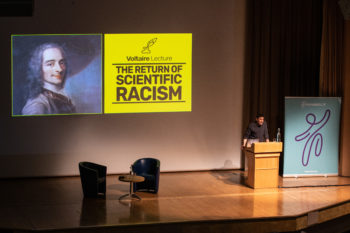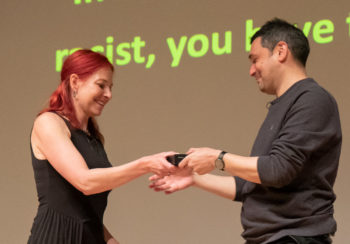Close to 800 people turned out in central London last week for Humanists UK’s 2019 Voltaire Lecture, part of the Humanists UK annual lecture series. This year, the lecture was given by geneticist and Humanists UK patron Dr Adam Rutherford, who spoke in the proud humanist tradition of anti-racist campaigning with a stirring and all-too-relevant lecture on ‘The return of scientific racism’. As in previous years, the lecture was chaired by the current President of Humanists UK, Professor Alice Roberts.
The theme of Adam’s lecture clearly struck a chord with many. Logan Hall in central London filled up with hundreds of people eager to learn about and challenge the spread of bogus ‘race science’. Both on the Internet and in popular discourse, so-called ‘scientific’ racism is having disastrous social effects by lending a veneer of scientific credibility to white supremacists on both sides of the Atlantic. While introducing his talk, Adam dared to venture a new, better title for the lecture than the one it had been promoted under, winning applause as he announced ‘The Voltaire Lecture 2019: How to argue with a racist.’
A troubling legacy
Adam began his lecture somewhat self-critically, speaking as both a scientist and a graduate of UCL. ‘Attempts to justify racism,’ he said, ‘have historically been rooted in misunderstandings and mis-reportings of science,’ and these were very often perpetrated by scientists themselves. He spoke in a UCL lecture hall about the uncomfortable association of that university and the wider London intelligentsia of the 19th and 20th centuries with an idea called eugenics: a discredited belief that the human race could be perfected through selective breeding. As Adam detailed, many leading minds of this age had at the very least flirted with eugenicist ideas, at least until they were comprehensively discredited by both the events of World War II and by the vigorous arguments of other thinkers in the 1930s and 1940s. He then broadened out his examples to show that even seismically important scientific figures like Carl Linnaeus, from whom all scientific classifications of living creatures today derive, were guilty of framing their ideas and discoveries in preposterous, non-scientific, and racist taxonomies of human beings. These, he showed, repeatedly revolved around human pigmentation and spurious associations between these and intelligence, physical aptitude, or moral character. Outside the west, even, these patterns of ‘biological racism’ recurred: the 11th century Persian scholar Avicenna wrote of both white Europeans and black Africans as being uniquely suited to slavery. The lecture’s very own namesake, François-Marie Arouet Voltaire, also came in for profound criticism, as someone who outside of his satirical writing on ethics, religion, and philosophy, indulged profoundly dehumanising views about people from different continents. (In other writings, he satirised racism and wrote scathing critiques of the slave trade, saying of slave traders that ‘no one could treat their relatives more horribly’.)

He invited his audience to consider the legacy of this history of racist inequality, and how it might manifest today in systemic or institutional racism: prevailing inequality in our society. ‘It’s often said that we shouldn’t apply contemporary morality to historical figures,’ Adam said. ‘But often this line is used to shut down investigation of our past and therefore the origins of the way we are today. Not everyone in the past was equally racist.’ Adam’s ‘personal hero’, Charles Darwin, proved himself to be ‘measurably less racist’ than many of his contemporaries. He was one of the first to suggest that racial classifications, as thought about then and largely still today, were scientifically unsound. And yet even Darwin’s descendants and successors, like TH Huxley, wrote of race in a way that appeared almost to speciate humans. But as Adam demonstrated with copious graphs and charts, no sharp boundaries could be shown to exist, in genetic terms, between people of different races. Attempts to cluster these into groups would always prove futile; a researcher will find as many groups as they are looking to discover. ‘There is more human variation within pigmentation genes within Africa than within the rest of the world put together,’ he said. Race is fundamentally, then, a social construct, but the geneticist cautioned against falling back on trite expressions like ‘race doesn’t exist’. Most of human society is made up of social constructs, he argued: ‘race exists because humans perceive it; racism exists because humans enact it.’
How to argue with a racist
Using graphs and charts and citing some of the best studies conducted into perceived racial variations, Adam demolished patently racist ideas that still persist in modern discourse. The widespread idea that black people made poor swimmers, he showed, had everything to do with structural racism, social inequality, and legacies of segregation, and nothing to do with ‘bone density’ or physiological differences. Racism, not race, led to significant disparities across the United States, with black boys being three times as likely to drown in the US compared to white boys. Even the performance of elite sportspeople, he showed, couldn’t be used as a basis for making conclusions about race: top athletes are, by their nature, extreme genetic, social, and psychological outliers who scarcely resemble the normal population. ‘We impose deep cultural biases on what we observe without a factual basis for doing so… Racism has relied on pseudo-scientific grounds for decades. Science cannot justify the bigotry of racists.’ He concluded with a call to arms to his audience, and to others like him in the scientific community, to be unafraid and even zealous when reporting the facts, because pro-racist forces in society were not above using lies or exploiting ignorance to spread their ideas. He exhorted his listeners to join him in actively exposing, arguing with, and defeating racism wherever they found it.

Walking away from the lecture, many will have lingered on Adam’s closing words, printed upon a final slide on the stage at Logan Hall. It came from the American activist and author Angela Davis, who said: ‘In a racist society it is not enough to be non-racist. We must be anti-racist.’
Humanists UK President Alice Roberts had the honour of presenting Adam with the inaugural Voltaire Lecture Medal, in recognition of both that evening’s lecture and his broader achievements as a geneticist and a science communicator. Reflecting on Adam’s fierce criticism of Voltaire himself, she smiled and reflected that awarding him the medal for it was an appropriately Voltairean act; the French thinker’s philosophy was summed up by his biographer Evelyn Beatrice Hall with the phrase ‘I disapprove of what you say, but I will defend to the death your right to say it.’ The award was presented on behalf of Humanists UK, whose public lectures have always aimed to stimulate public debate and galvanise discussion, in complement to its campaigning for a better society.
Humanists UK is not just the national charity that speaks up for non-religious people, but a growing movement dedicated to the vision of a tolerant society where rational thinking and kindness prevail. Over nearly 125 years, Humanists UK has vigorously challenged the spread of pseudoscience and racial, religious, homophobic, and sexist hatred in society. In 1911, its leading figures organised the world’s first-ever global conference against racism. In the 1940s, another generation of Humanists UK leaders founded international institutions such as UNESCO, whose founding purpose was the promotion of humanist values and education as a defence against the dehumanising and pseudo-scientific ideologies that made the genocides of World War II possible.
Notes
Humanists UK is the national charity working on behalf of non-religious people. Powered by over 85,000 members and supporters, we advance free thinking and promote humanism to create a tolerant society where rational thinking and kindness prevail. We provide ceremonies, pastoral care, education, and support services benefiting over a million people every year and our campaigns advance humanist thinking on ethical issues, human rights, and equal treatment for all.
The Voltaire Lecture was established by the legacy of Theodore Besterman, biographer of Voltaire, for lectures on ‘any aspect of scientific or philosophical thought or human activity as affected by or with particular reference to humanism.’ Previous Voltaire lecturers have included: Professor Sir David King, Professor Anthony Grayling, Baroness Wootton, Professor Steven Pinker, Professor Brian Cox, Professor Richard Dawkins, Natalie Haynes, Professor Robert Hinde, Bettany Hughes, Michael Foot, Kenan Malik, Lord Taverne, Nick Cohen, Dr Henry Marsh, Bonya Ahmed, and Sir Ludovic Kennedy. It is always chaired by the President of Humanists UK.
The 2019 Voltaire Lecture was recorded and will be uploaded to YouTube at a later date.
